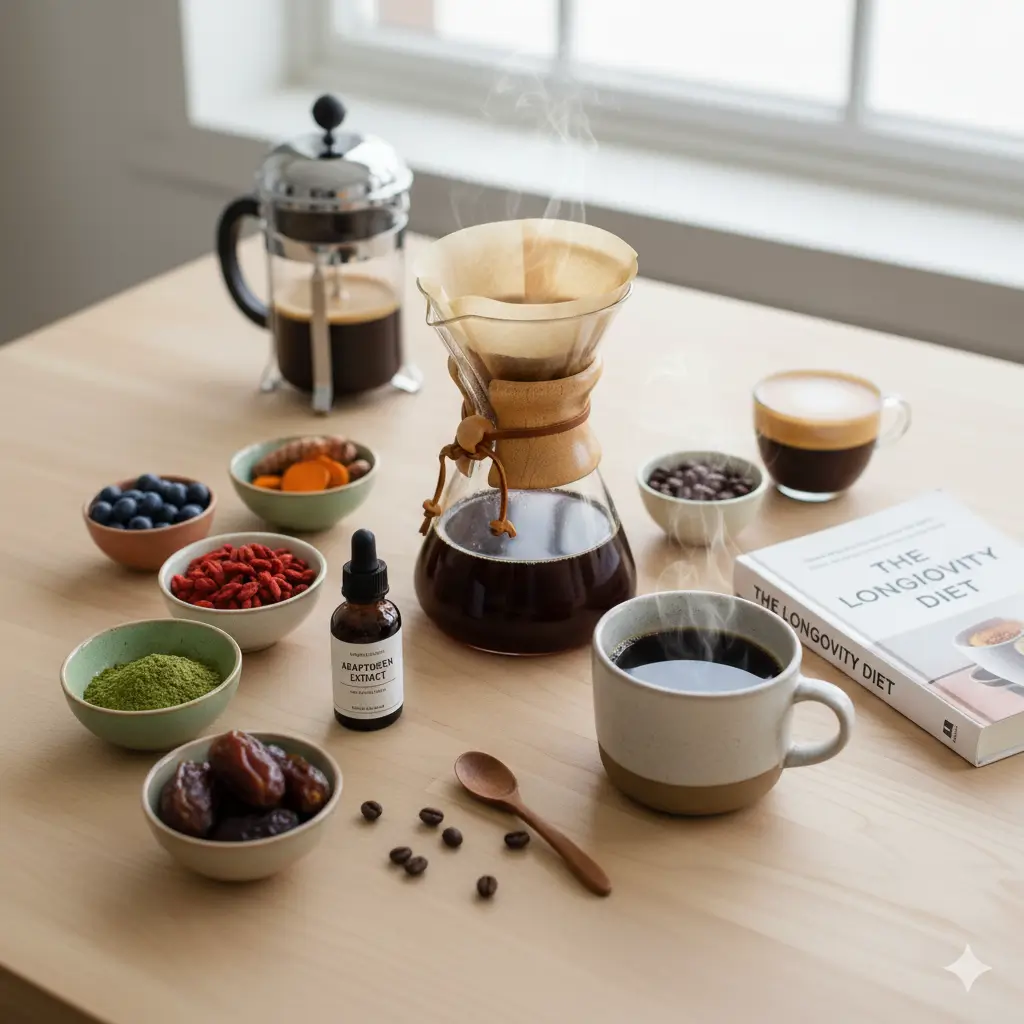You probably enjoy your daily coffee, and you’ll be happy to know that more and more research points to its role in helping you live a longer, healthier life. This popular drink holds many bioactive compounds that boost your overall health. They can even lower your risk of dying from all causes. But choosing the best coffee for longevity isn’t just about grabbing any cup. Your bean choice, how you brew it, and how much you drink each day all matter. We’ll look at these factors to help you get the most from coffee’s incredible long-life benefits.
- What is the science behind coffee and longevity?
- Which brewing methods are best for longevity?
- How much coffee is best for longevity?
- Does your bean choice matter for the best coffee for longevity?
- When might coffee not support longevity: potential downsides?
- How can savoring your path to a longer, healthier life include the best coffee for longevity?
What is the science behind coffee and longevity?
The science behind coffee and longevity shows that its complex mix of compounds positively affects many biological processes. Ultimately, this helps you live a longer, healthier life. Studies often link regular coffee drinking to a lower risk of chronic diseases and overall mortality. These protective effects come from how coffee works with your cells, fighting off the stressors that lead to aging.
What are the bioactive compounds in coffee for longevity?
Coffee contains several bioactive compounds that truly help with your longevity benefits. These compounds work together to protect your body right down to the cellular level. Knowing what’s in your coffee helps you choose the best coffee for longevity.
- Caffeine: You know this stimulant. It affects how your body uses energy. It activates cellular pathways like AMPK and slows down the mTOR pathway. These pathways are important for cellular repair and healthy aging. Caffeine gives you a moderate boost that supports your long-term brain health and keeps your metabolism balanced.
- Chlorogenic Acids (CGA): These are powerful antioxidants called polyphenols. They effectively neutralize free radicals and greatly reduce oxidative stress and inflammation. CGAs protect you from serious conditions like neurodegenerative diseases, cardiovascular disease, Type 2 Diabetes, and various types of cancer. All of these are vital for increasing your human longevity.
- Other Polyphenols: Compounds like ferulic acid give you extra antioxidant and anti-inflammatory benefits. This directly lowers the cellular stress often linked to aging. They add to coffee’s overall longevity benefits.
- Trigonelline: This compound is important for your mitochondrial health. It boosts the activity of antioxidant enzymes. It actively gets rid of reactive oxygen species, giving your cells strong protection against oxidative damage.
- Diterpenes (cafestol and kahweol): These specific compounds have anti-inflammatory properties. They can also help with insulin regulation and other aging-related pathways. But be aware: if you drink unfiltered coffee, they can also affect your cholesterol levels.
- Melanoidins: These form during the coffee roasting process. Melanoidins themselves show strong antioxidant properties. They actively help reduce oxidative damage, further boosting coffee’s protective power.
Think about it: these coffee compounds work together to manage key cellular pathways linked to aging. They reduce oxidative damage from free radicals and lower inflammation. They also support your mitochondrial function and improve metabolic health. These are all crucial for your human longevity. Their combined power makes coffee a strong partner in your quest for a longer, healthier life.
How do coffee compounds modulate aging pathways for longevity?
These various coffee compounds work together to manage important aging-related cellular pathways like AMPK, mTOR, and Insulin/IGF-1 signaling. They do this by cutting down on oxidative stress, reducing inflammation, and boosting mitochondrial function. This comprehensive action helps keep your cells healthy and improves your overall metabolic health. These are foundational steps for promoting your human longevity.
What epidemiological evidence links coffee to reduced mortality and longevity?
Plenty of studies consistently show that drinking coffee regularly links to a lower risk of death from all causes and a longer life expectancy for you. Research shows a lower risk of dying from serious chronic conditions like Cardiovascular Disease, Cerebrovascular Diseases, Type 2 Diabetes, and certain Cancers. Plus, drinking coffee regularly has been connected to a notable drop in your Dementia Risk, especially with filtered coffee. This truly highlights its profound coffee longevity benefits.
Which brewing methods are best for longevity?
Filtered (Drip) Coffee generally stands out as the healthiest coffee brewing method for longevity. Why? Because it removes harmful compounds while keeping the good ones. Different brewing techniques really change what’s in your cup. This affects the healthful antioxidants and also compounds like diterpenes, which might be bad for you. Picking the right method makes all the difference in getting the most coffee longevity benefits.
Why is filtered (drip) coffee considered the longevity champion?
People often call Filtered Coffee, usually made with a drip machine and paper filters, the longevity champion. Here’s why: paper filters effectively remove diterpenes that can raise cholesterol. These compounds, specifically cafestol and kahweol, are naturally in coffee oils. But they can increase unhealthy LDL cholesterol levels in your blood. By filtering them out, drip coffee gives you big cardiovascular benefits. This leads to a lower risk of death from all causes and a reduced Dementia Risk. That makes it the best coffee for longevity.
What are the risks of French Press and unfiltered methods for longevity?
French Press Coffee and other unfiltered brewing methods aren’t as good for your longevity. They don’t remove diterpenes. These methods let coffee oils, full of cafestol and kahweol, pass right into your cup. You end up drinking more diterpenes, which can raise your cholesterol levels, especially LDL cholesterol. This might actually cancel out the positive cardiovascular health benefits you usually get from coffee.
What are the unique profiles and emerging benefits of Espresso and Cold Brew coffee for longevity?
Espresso gives you a highly concentrated shot of antioxidants in a small serving. Each shot has a moderate amount of caffeine. It’s rich in good compounds, but we don’t have as much long-term longevity research on espresso specifically compared to filtered coffee. It still offers known health advantages. Cold Brew coffee, known for its low acidity and smooth taste, is gentler on sensitive stomachs. We also don’t have as many large studies on its health impact for longevity, but it definitely delivers antioxidants.
| Brewing Method | Caffeine (per 8 oz approx.) | Key Health Considerations | Lifespan & Cardiovascular Impact |
|---|---|---|---|
| Filtered (Drip) | ~95 mg | Removes diterpenes, heart-friendly, high antioxidants | Linked to ~15-20% lower mortality risk, better heart health, lower dementia risk |
| French Press | 80-120 mg | Retains oils, higher diterpenes, may raise cholesterol | Less favorable due to cholesterol impact |
| Espresso | ~63 mg (per 1 oz shot) | High antioxidants, small volume, moderate caffeine | Positive effects, less direct evidence for overall lifespan extension compared to filtered |
| Cold Brew | 150-200 mg | Low acidity, smoother taste, varying caffeine | Potential antioxidants, less studied specifically for longevity benefits |
How much coffee is best for longevity?
For the best coffee for longevity, you generally want to aim for moderate coffee consumption—think 2 to 3 cups daily. This amount helps you get the most protective effects from coffee’s bioactive compounds without the risks of drinking too much. The right dosage makes sure you receive great coffee longevity benefits by reducing inflammation and oxidative stress, and improving your metabolic health.
What is the “sweet spot” for coffee consumption to support longevity?
The “sweet spot” for drinking coffee to support your human longevity is usually 2 to 3 cups daily. This moderate coffee consumption consistently links to a reduction in all-cause mortality. Research suggests this amount could add about 1.8 years to your life expectancy. It helps protect you against cardiovascular issues, stroke, and certain types of cancer.
Why is black coffee essential for maximizing longevity advantages?
Drinking black coffee is essential if you want to get the most longevity advantages. Adding too much sugar, cream, or other high-calorie, high-fat extras can actually undo the health benefits. These additions bring in unnecessary calories, added sugar, and saturated fat. Those are bad for your metabolic health and can raise your risk of chronic diseases. Just think: a sugary latte can easily turn a healthy drink into something far less beneficial.
Why does timing matter for maximizing coffee longevity benefits?
The timing of your coffee really matters for getting the most longevity benefits. Evidence suggests drinking coffee earlier in the day connects to greater reductions in your risk of death. If you drink coffee late in the afternoon or evening, you might disrupt your sleep. Poor sleep negatively affects your overall health and well-being. Try to align your coffee intake with your natural body clock. Avoiding it close to bedtime helps you maintain restorative sleep cycles, which are vital for long-term health and managing inflammation.
Does your bean choice matter for the best coffee for longevity?
Yes, your bean choice absolutely matters for the best coffee for longevity. Arabica and Robusta coffee beans have different chemical profiles and can affect your health in different ways. These differences mostly come down to their Caffeine Content, the levels of Chlorogenic Acids (CGA), and other Antioxidants. Your personal tolerance and what you want for your health will help you pick the best one for long-term wellness.
What are the balanced benefits of Arabica coffee for sustained health?
Arabica coffee beans contain less caffeine (around 1.5%) and a balanced mix of antioxidants. This gives you a gentler boost and supports lasting health. This type offers great anti-inflammatory and neuroprotective effects, boosting your long-term Brain Health. Arabica also supports good gut bacteria and links to lower risks of conditions like colorectal cancer and liver cancer. For many, this makes it a strong choice for the best coffee for longevity.
What are the potent antioxidants and higher caffeine levels in Robusta coffee?
Robusta coffee beans have much higher caffeine content (around 2.7%) and more powerful levels of CGAs. This means stronger antioxidant and anti-inflammatory benefits for you. This robust profile can give you more vigorous energy and meet higher Metabolic Needs, appealing to those who want more cognitive and performance boosts. But its higher acidity and stronger effects might be tough for you if you have Digestive Sensitivity or tend to get overstimulated, even with all its powerful protective compounds.
How do you personalize your bean choice for long-term wellness and longevity?
Choosing your coffee bean for long-term wellness and longevity really depends on your personal caffeine tolerance and digestive sensitivity. If you’re sensitive to caffeine or just like a milder taste, Arabica might be a better choice. It offers balanced health benefits. On the other hand, if you handle caffeine well and want a stronger antioxidant kick, Robusta might fit your individual health impacts and goals better. The best coffee for longevity is ultimately the one that makes you feel good without any bad side effects.
When might coffee not support longevity: potential downsides?
Sometimes, coffee might not support your longevity. This happens if you drink too much, or if you have specific sensitivities. These situations can lead to negative health outcomes. The main risks come from too much caffeine intake and the diterpenes found in unfiltered brewing methods. You should know about these coffee risks to longevity to make smart choices.
What are the risks to consider with excessive caffeine intake from coffee?
Drinking too much caffeine from coffee can lead to several negative health problems. This might actually undo some of coffee’s longevity benefits. It often causes anxiety and serious sleep disturbances, which mess with the restorative sleep your health needs. High consumption can also trigger or worsen digestive issues, like a laxative effect or loose stools. In rare cases, extremely high doses have even been linked to Rhabdomyolysis, a severe muscle breakdown. Plus, too much caffeine can raise your high blood pressure, cause palpitations or arrhythmias, and lead to unpleasant withdrawal symptoms like headaches and nervousness if you stop. These important coffee risks to longevity mean you need to watch how much you drink.
What individual sensitivities and health conditions may impact coffee longevity benefits?
Your unique sensitivities and certain health conditions can affect how well coffee helps your longevity. You might need to be careful or even avoid it. For instance, if you have Irritable Bowel Syndrome (IBS), coffee’s stimulating effects on your digestive tract could make your symptoms worse. Similarly, if you experience Loss of Bladder Control, you might find yourself needing to go to the bathroom more often. Drinking a lot of coffee, especially if you don’t get enough calcium, can increase calcium loss in your urine, which might contribute to Osteoporosis over time. Doctors generally advise pregnant women to limit caffeine. And certain health conditions, like uncontrolled high blood pressure or severe heart rhythm issues, might mean you should cut back or skip coffee altogether. Smokers who drink coffee may also face a higher risk of heart disease or cancer, showing how risk factors can work together to harm your overall human longevity prospects.
What are the dangers of unfiltered coffee revisited for longevity?
Let’s revisit the dangers of unfiltered coffee, especially for your longevity. The main concern is the presence of diterpenes like cafestol and kahweol. These compounds don’t get removed by brewing methods like French Press or boiled coffee. We know they can really increase your unhealthy LDL Cholesterol levels. High LDL cholesterol is a major risk factor for Cardiovascular Disease. This means it could cancel out many of coffee’s otherwise good effects on your heart health and overall lifespan.
How can savoring your path to a longer, healthier life include the best coffee for longevity?
You can certainly include the best coffee for longevity on your path to a longer, healthier life. Just make it a moderate, thoughtful part of your daily routine. By understanding the science behind coffee longevity benefits, you can make choices that truly boost your well-being. This approach uses the power of coffee’s bioactive compounds while keeping potential downsides to a minimum.
Remember, drinking coffee in moderation—ideally 2-3 cups of filtered coffee each day—gives you strong protection against all-cause mortality and chronic diseases. The powerful antioxidants and anti-inflammatory properties from compounds like Caffeine and Chlorogenic Acids really help you age healthily. Stick to black coffee and pay attention to how your body responds. This ensures you get the most benefits. Let coffee be a healthy part of your journey toward living longer.









